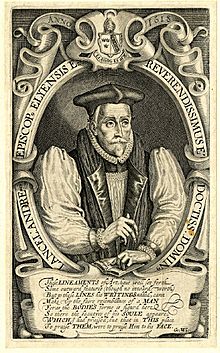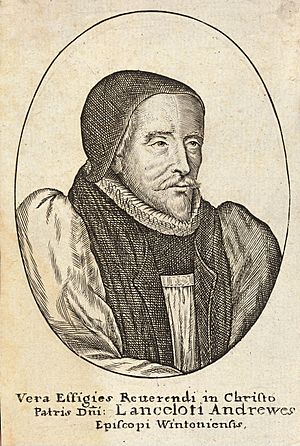Lancelot Andrewes facts for kids
Quick facts for kids Lancelot Andrewes |
|
|---|---|
| Bishop of Winchester | |
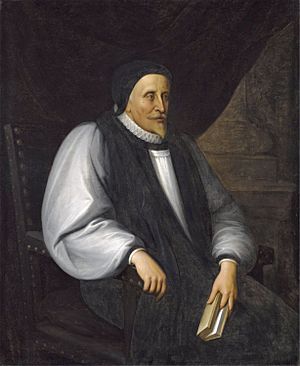
"Bishop Andrews", c. 1660
|
|
| Church | Church of England |
| Diocese | Winchester |
| In Office | 1619–1626 |
| Predecessor | James Montague |
| Successor | Richard Neile |
| Other posts | Dean of the Chapel Royal (1618–1626) Bishop of Ely (1609–1619) Lord Almoner (1605–1619) Bishop of Chichester (1605–1609) Dean of Westminster (1601–1605) |
| Orders | |
| Ordination | c. 1579 (deacon); 1580 (priest) |
| Consecration | 1605 |
| Personal details | |
| Born | 1555 All Hallows-by-the-Tower, City of London, England |
| Died | 25 September 1626 (aged 70–72) Southwark, Surrey, England |
| Nationality | English |
| Denomination | Anglican |
| Residence | Winchester House, Southwark (at death) |
| Parents | Thomas Andrewes (father) |
| Occupation | Preacher, translator |
| Alma mater | Pembroke Hall, Cambridge |
| Lancelot Andrewes | |
|---|---|
| Venerated in | Anglican Communion |
| Feast | 25 September (Church of England) 26 September (ECUSA) |
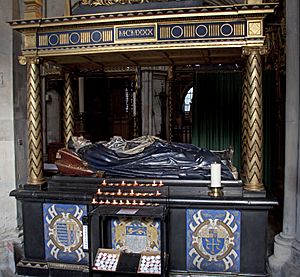
Lancelot Andrewes (1555–25 September 1626) was an important English bishop and scholar. He held high positions in the Church of England during the reigns of Queen Elizabeth I and King James I.
During King James's time, Andrewes became a bishop in Chichester, then Ely, and finally Winchester. He also helped translate the famous King James Version of the Bible. The Church of England remembers him on September 25th with a special day.
Contents
Early Life and Education
Lancelot Andrewes was born in 1555 near the Tower of London. His father, Thomas, was a master of Trinity House, an important maritime organization. Lancelot went to Cooper's free school and then Merchant Taylors' School.
In 1571, he started studying at Pembroke Hall in Cambridge. He earned his first degree, a Bachelor of Arts, and then a Master of Arts in 1578. He was known for being very smart and his academic reputation grew quickly.
Becoming a Priest
In 1576, Andrewes became a fellow at Pembroke College. On June 11, 1580, he was ordained as a priest. He also became a Master of Arts at Oxford in 1581.
As a teacher at his college, he gave lectures on the Ten Commandments. These lectures were very popular and were later published. Andrewes was also known for learning many European languages during his holidays. His brother, Roger Andrewes, also helped translate the King James Bible.
Serving Under Queen Elizabeth I
In 1588, Lancelot Andrewes became the vicar of St Giles, Cripplegate in London. He gave powerful sermons there. He strongly supported the English Reformation, which was when the Church of England separated from the Roman Catholic Church.
Andrewes was appointed to important church roles through the influence of Francis Walsingham. He became a prebendary (a type of church official) at St Paul's Cathedral in 1589. He also became the master of Pembroke College and a chaplain to the Archbishop of Canterbury.
Preaching and Royal Service
As a chaplain to Queen Elizabeth I, he preached before her. He also gave lectures at St Paul's, which were later collected as The Orphan Lectures. Andrewes enjoyed meeting people and was part of a group of scholars and thinkers.
He did not get promoted to bishop earlier because he disagreed with selling off church property. In 1598, he turned down offers to become a bishop in Ely and Salisbury. In 1601, he became the Dean of Westminster, where he focused on the school.
When the plague hit in 1603, Andrewes moved to Chiswick. He continued teaching the boys from Westminster School there. He preached that people should leave London during the plague to stay safe.
During King James I's Reign
When James I became king, Andrewes became very popular. He helped with James's coronation. In 1604, he took part in the Hampton Court Conference, a meeting about religious issues.
The King James Bible
Lancelot Andrewes's name was first on the list of scholars chosen to create the Authorized Version of the Bible. This Bible, known as the King James Version, was started in 1604 and published in 1611. He led the group that translated the first books of the Old Testament, from Genesis to 2 Kings. He also helped oversee the entire project.
Bishop and Royal Advisor
In 1605, Andrewes became the Bishop of Chichester. He was also made the Lord High Almoner, a royal official who distributed money to the poor. After the Gunpowder Plot was discovered, Andrewes preached a sermon to the king in 1606. This sermon explained why the event should be remembered.
In 1609, he became the Bishop of Ely. He continued to write scholarly works. In 1617, he traveled with King James I to Scotland. The goal was to convince the Scots that having bishops was better than their Presbyterian church system.
Andrewes was made the Dean of the Chapel Royal. In 1619, he became the Bishop of Winchester, a large and important church area. He managed this diocese very well. He died in 1626 in his palace in Southwark and was buried near the altar at St Saviour's, which is now Southwark Cathedral.
Lasting Impact
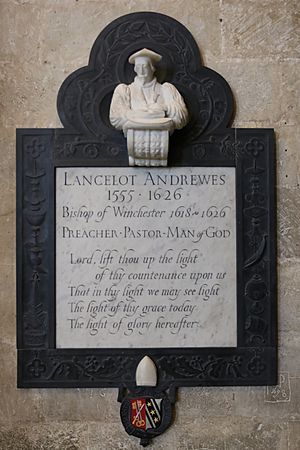
Andrewes was a friend of Hugo Grotius, a famous Dutch scholar. Andrewes was known as one of the smartest scholars of his time. He is mostly remembered for his unique preaching style. He was a typical Anglican churchman, meaning he was different from both the Puritan and Roman Catholic views.
He preached regularly before King James I and his court. These sermons often supported the idea of the Divine Right of Kings, which meant kings got their power directly from God.
Famous Works and Influence
His most famous work is the Preces Privatae, or Private Prayers. These prayers have been very popular and are still printed today. His other writings fill many volumes. Ninety-six of his sermons were published in 1631 by order of King Charles I. These sermons are considered some of the best and most detailed from that time.
Andrewes was seen as one of the most learned churchmen of his day. He was known as an eloquent and passionate preacher. Even though his style can seem old-fashioned now, his sermons contain beautiful and deep ideas.
He continues to influence religious thinkers today. The famous writer T. S. Eliot was influenced by Andrewes. Eliot even used a passage from one of Andrewes's Christmas sermons in his poem "Journey of the Magi". The writer Kurt Vonnegut called Andrewes "the greatest writer in the English language." He pointed to Andrewes's translation work in the 23rd Psalm as proof.
Andrewes's work on the King James Bible has led him to appear as a character in several plays. An academic cap, called the Bishop Andrewes cap, is named after him. It is a velvet cap, similar to a mortarboard, and is still used at some universities today.
Andrewes's Library
Lancelot Andrewes had a large personal library. In his will, he left about 400 books to Pembroke College, where they are still kept today.
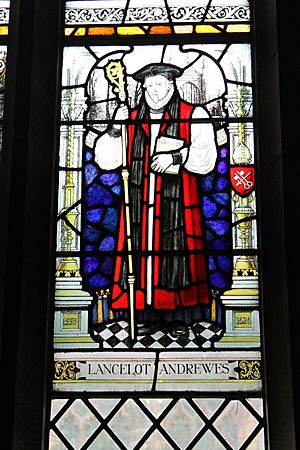
 | Stephanie Wilson |
 | Charles Bolden |
 | Ronald McNair |
 | Frederick D. Gregory |


